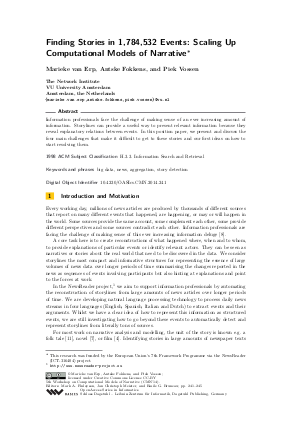Finding Stories in 1,784,532 Events: Scaling Up Computational Models of Narrative
Authors Marieke van Erp, Antske Fokkens, Piek Vossen
-
Part of:
Volume:
2014 Workshop on Computational Models of Narrative (CMN 2014)
Part of: Series: Open Access Series in Informatics (OASIcs) - License:
 Creative Commons Attribution 3.0 Unported license
Creative Commons Attribution 3.0 Unported license
- Publication Date: 2014-08-08
File

PDF
OASIcs.CMN.2014.241.pdf
- Filesize: 330 kB
- 5 pages
Document Identifiers
Subject Classification
Keywords
- big data
- news
- aggregation
- story detection
Metrics
- Access Statistics
-
Total Accesses (updated on a weekly basis)
0Document
0Metadata
Abstract
Information professionals face the challenge of making sense of an ever increasing amount of information. Storylines can provide a useful way to present relevant information because they reveal explanatory relations between events. In this position paper, we present and discuss the four main challenges that make it difficult to get to these stories and our first ideas on how to start resolving them.
Cite As Get BibTex
Marieke van Erp, Antske Fokkens, and Piek Vossen. Finding Stories in 1,784,532 Events: Scaling Up Computational Models of Narrative. In 2014 Workshop on Computational Models of Narrative. Open Access Series in Informatics (OASIcs), Volume 41, pp. 241-245, Schloss Dagstuhl – Leibniz-Zentrum für Informatik (2014)
https://doi.org/10.4230/OASIcs.CMN.2014.241
BibTex
@InProceedings{vanerp_et_al:OASIcs.CMN.2014.241,
author = {van Erp, Marieke and Fokkens, Antske and Vossen, Piek},
title = {{Finding Stories in 1,784,532 Events: Scaling Up Computational Models of Narrative}},
booktitle = {2014 Workshop on Computational Models of Narrative},
pages = {241--245},
series = {Open Access Series in Informatics (OASIcs)},
ISBN = {978-3-939897-71-2},
ISSN = {2190-6807},
year = {2014},
volume = {41},
editor = {Finlayson, Mark A. and Meister, Jan Christoph and Bruneau, Emile G.},
publisher = {Schloss Dagstuhl -- Leibniz-Zentrum f{\"u}r Informatik},
address = {Dagstuhl, Germany},
URL = {https://drops.dagstuhl.de/entities/document/10.4230/OASIcs.CMN.2014.241},
URN = {urn:nbn:de:0030-drops-46601},
doi = {10.4230/OASIcs.CMN.2014.241},
annote = {Keywords: big data, news, aggregation, story detection}
}
Author Details
References
-
Rodrigo Agerri, Josu Bermudez, and German Rigau. Ixa pipeline: Efficient and ready to use multilingual nlp tools. In To appear in Proceedings of the 9th Language Resources and Evaluation Conference (LREC2014), Reykjavik, Iceland, May 26-31 2014.

-
Julio César Bahamón and R. Michael Young. A choice-based model of character personality in narrative. In Proceedings of the 2012 Workshop on Computational Models of Narrative, Istanbul, Turkey, May 26-27 2012.

-
Mieke Bal. De theorie van verhalen en vertellen. Inleiding in de narratologie, 1980.

-
David Bordwell. Narration in the Fiction Film. Routledge, 1985.

-
Agata Cybulska and Piek Vossen. Using a sledgehammer to crack a nut? lexical diversity and event coreference resolution. In To appear in Proceedings of the 9th Language Resources and Evaluation Conference (LREC2014), Reykjavik, Iceland, May 26-31 2014.

-
Antske Fokkens, Marieke van Erp, Piek Vossen, Sara Tonelli, Willem Robert van Hage, Luciano Serafini, Rachele Sprugnoli, and Jesper Hoeksema. GAF: A grounded annotation framework for events. In Eduard Hovy, Teruko Mitamura, and Martha Palmer, editors, Proceedings of the 1st workshop on Events: Definition, Detection, Coreference, and Representation at the Conference of the North American Chapter of the Association for Computational Linguistics: Human Language Technologies (NAACL2013), Atlanta, GA, USA, Jun 9-15 2013. Association for Computational Linguistics.

-
Gérard Genette. Narrative Discourse. Basil Blackwell, 1980.

-
Jonathan Gray, Liliana Bounegru, and Lucy Chambers, editors. The Data Journalism Handbook. O'Reilly Media, 2012.

-
Harry Halpin and Patrick J. Hayes. When owl:sameAs isn't the Same: An Analysis of Identity Links on the Semantic Web. In Proceedings of LDOW2010, Raleigh, NC, USA, April 27 2010.

-
Sas̆a Petrović, Miles Osborne, and Victor Lavrenko. Streaming first story detection with application to twitter. In Proceedings of the 11th Annual Conference of the North American Chapter of the Association for Computational Linguistics (NAACL2010), 2010.

-
Vlad'imir Propp. Morphology of the Folk Tale. The American Folklore Society and Indiana University, 2nd edition, 1968.

-
Dafna Shahaf and Carlos Guestrin. Connecting the dots between news articles. In Proceedings of KDD'10, Washington, DC, USA, July 25-28 2010.

-
Andrea Umbricht. Patterns of news making in western journalism a content analysis of newspapers across six western democracies and five decades. Technical report, Institute of Mass Communication and Media Research (IPMZ), 2014.

